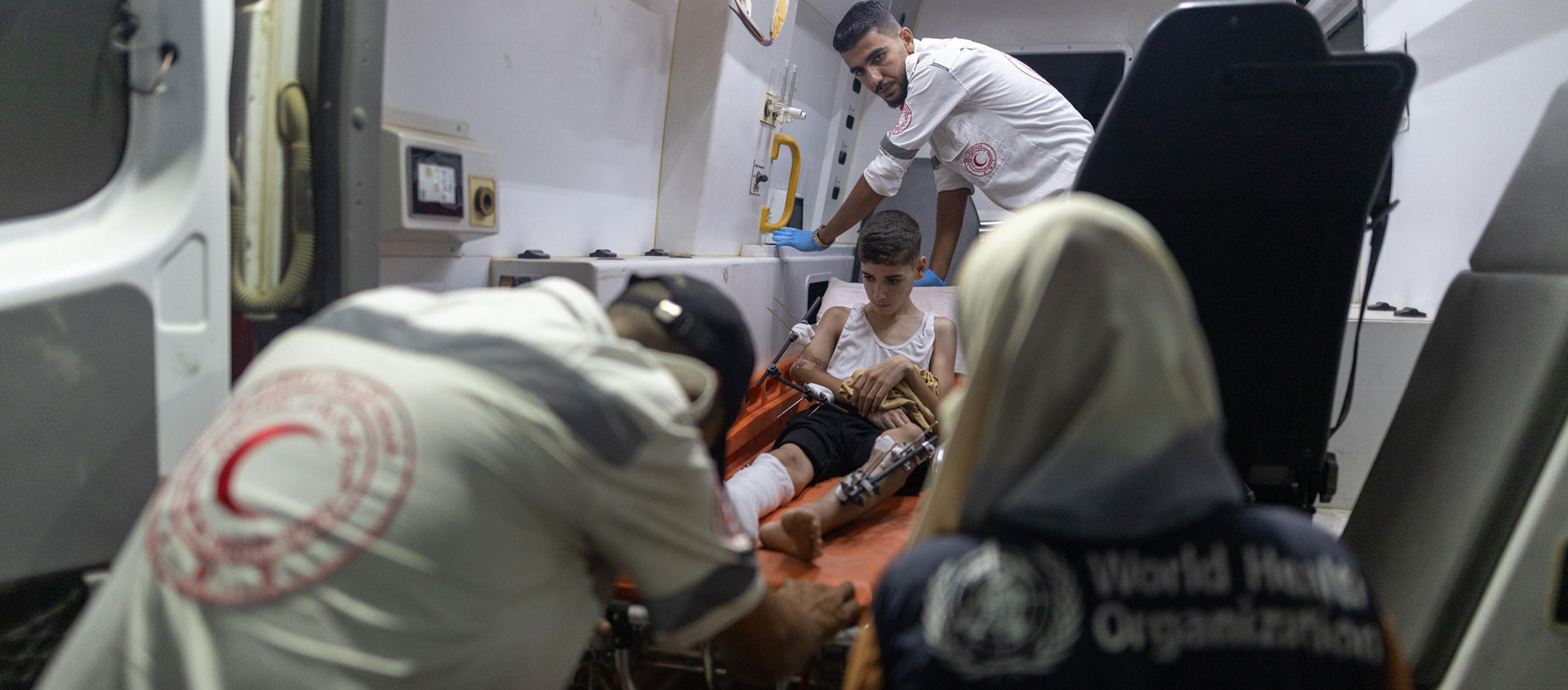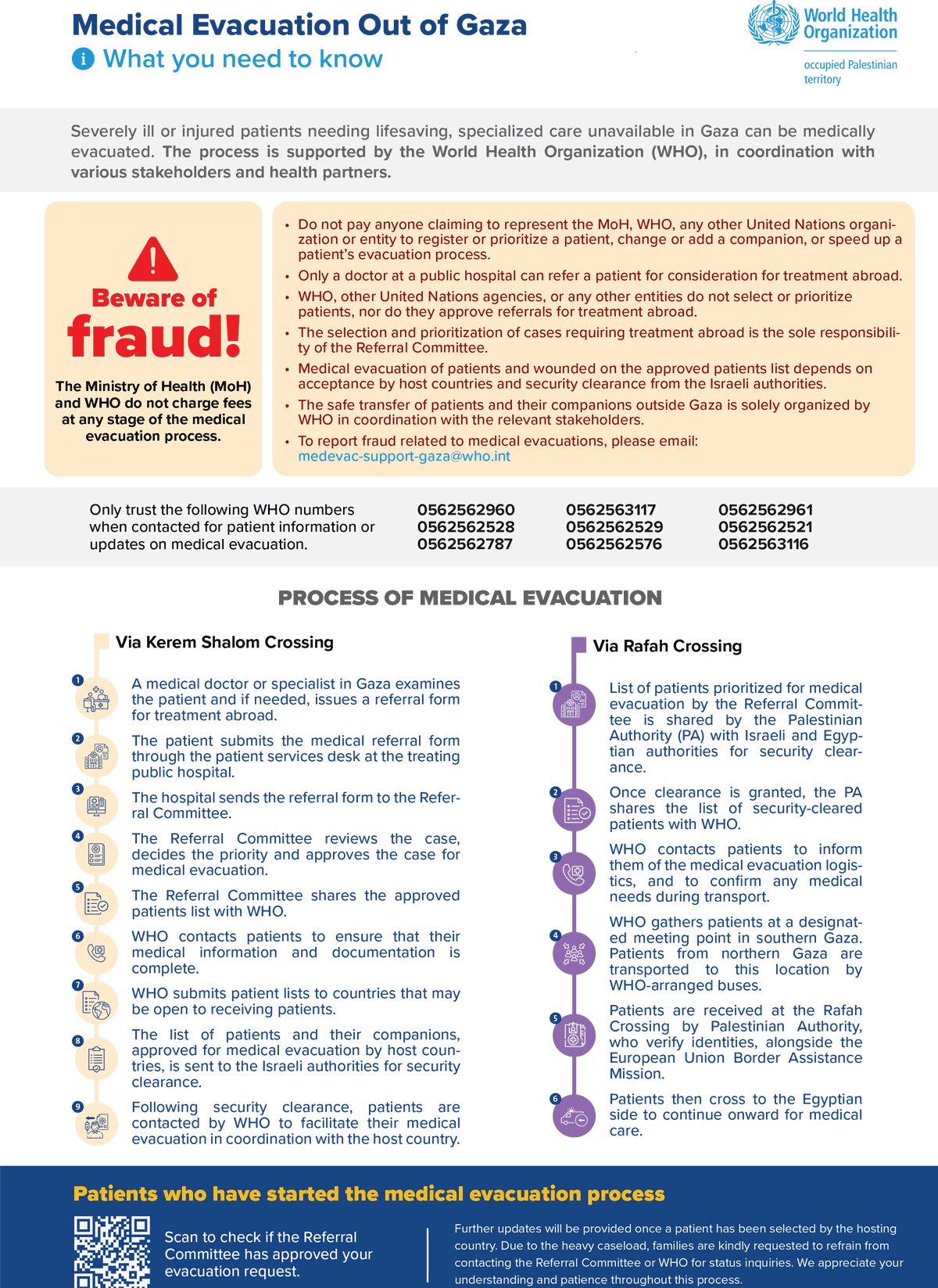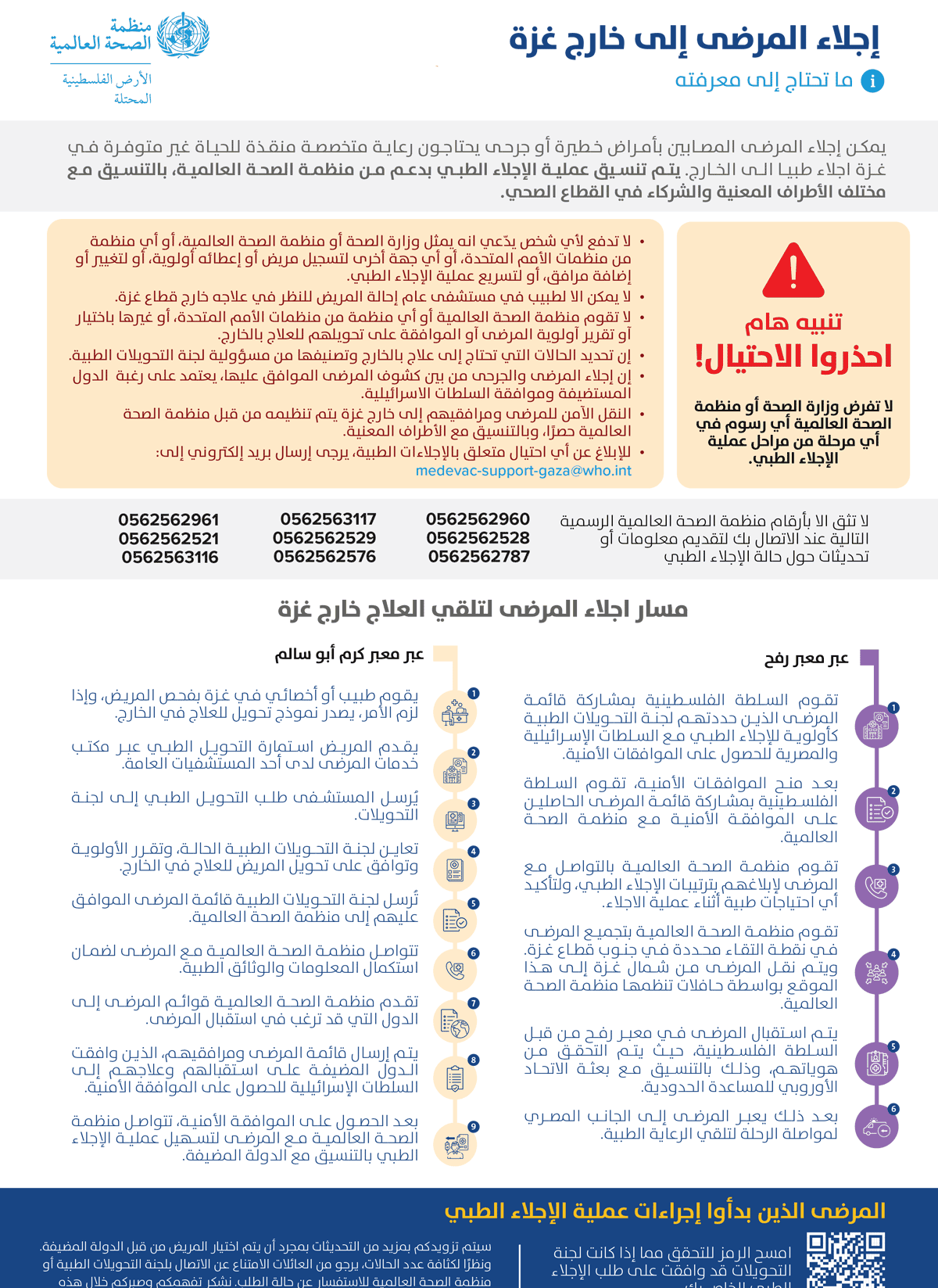
Infographics
More infographics on medical evacuation of Gaza patients
Questions and answers
General questions
What is the purpose of medical evacuation from Gaza?
Severely ill or injured patients needing lifesaving, specialized care not available in the Gaza Strip can be medically evacuated abroad. The process is supported by the World Health Organization (WHO), in coordination with various stakeholders and health partners.
Who is eligible for medical evacuation?
Patients needing urgent and specialized care not available in Gaza are eligible for medical evacuation. Clinical prioritization of patients is decided by the Referral Committee in the following order:
- Emergency cases
- Urgent cases
- Chronic conditions with complications
- Chronic conditions without complications
Who can request to begin the process of medical evacuation for a patient?
Only a treating doctor or medical specialist at a public hospital can refer a patient to the Referral Committee for approval for treatment abroad. The Referral Committee reviews the case, decides the priority according to standardized clinical protocols and approves the case for medical evacuation.
Who organizes medical evacuation in Gaza?
The medical evacuation process supported by WHO. The safe transfer of patients and their companions to medical evacuation collection points within the Gaza Strip, and their movement outside the Strip, is carried out by WHO in coordination with the relevant Palestinian and Israeli authorities.
Process of Medical Evacuation
How is the medical evacuation process initiated?
The process prior to medical evacuation consists of the following steps:
- A Gaza medical doctor or specialist working a public hospital examines the patient and if needed, issues a referral form for treatment abroad.
- Patient submits the medical referral form through the patient services desk at the treating public hospital.
- The hospital sends the referral form to the Referral Committee.
- The Referral Committee reviews the case, decides the priority and approves the case for medical evacuation.
- The Referral Committee shares the approved patients list with WHO.
- WHO contacts patients to ensure that their medical information and documentation is complete.
- WHO submits patient lists to countries that may be open to receiving patients.
- Once patients are approved, WHO shares a list of their companions with host countries for approval.
- The list of patients and their companions, approved for medical evacuation by host countries, is sent to the Israeli authorities for security clearance.
- Following security clearance, patients are contacted by WHO to facilitate their medical evacuation in coordination with the host country.
What official approvals are required for medical evacuation?
For medical evacuation approval is required from:
- The Referral Committee.
- The host country who will be providing medical care.
- Israeli authorities, in particular Coordination of Government Activities in the Territories (COGAT) for patient's exit and transit permissions.
- Egyptian or Jordanian authorities (if evacuation is to these countries or includes transit through these countries).
Can minors travel without a companion?
No. Children under 18 must be accompanied by a parent or a guardian.
Can minors travel with non-parent escorts?
Yes. If parents cannot travel, a first or second degree relative may accompany the child with written parental/ guardian consent.
Does a referral form guarantee medical evacuation?
No. The referral form initiates the medical evacuation process but does not guarantee evacuation out of Gaza. Medical referral by a doctor at a public hospital in Gaza only the first step. Clearance for medical evacuation also depends on availability of treatment within Gaza, approval by the Referral Committee, approval by host countries, security clearances by Israeli authorities, and border accessibility.
How long does final travel approval for medical evacuation take?
There is no fixed timeframe. Approval depends on case complexity, completion of documentation, coordination among concerned authorities, and security conditions.
Is the medical evacuation process accelerated for specific patients?
No. All patients are assessed fairly by the Referral Committee based on set criteria focusing on the severity of each case.
Can patients access their evacuation status or get updates?
Patients can check the "Sehhaty" app to see whether the Referral Committee has approved their evacuation request. Further updates are provided once the patient has been selected by the host country and received security clearance from the Israeli authorities. Due to the heavy caseload, families are requested to refrain from contacting the Referral Committee or WHO for status inquiries. Once approved for medical evacuation, WHO will contact patients to inform them of their approval and treatment option.
Can patient companion details be changed after referral has been processed by the Referral Committee?
Yes. WHO re-confirms patient and companion details a few days before the medical evacuation. Modifications to companion details can be made, provided they meet host country criteria and are granted security clearance.
How many companions can accompany a patient for medical evacuation?
Host countries normally allow one adult companion plus 2-3 children, however, this varies between countries.
Do patients have to pay if they want to increase the number of companions?
No. Companion numbers strictly follow the host country's criteria. No payments are accepted or requested by any party.
Can patient companion details be changed after referral has been processed by the MoH Referral Committee?
Yes. WHO re-confirms patient and companion details a few days before the medical evacuation. Modifications to companion details can be made, provided they meet host country criteria and are granted security clearance.
Are special arrangements made for people with disabilities or vulnerable groups?
Yes. WHO ensures the provision of assistive devices and appropriate medical care along the transfer route out of the Gaza Strip, up to the point where host countries assume responsibility. Host countries then provide specialized care and suitable housing for patients with disabilities or special needs.
Is psychological support available to those who are medically evacuated and their companions?
Yes. Mental health and psychosocial services are provided by host countries for patients and companions.
Is medical evacuation free of charge?
Medical evacuation is free of charge. No fee is charged by Ministry of Health (MoH), WHO, any UN body or any entity throughout the whole process. Beware of fraud. Do not pay anyone claiming to represent MoH, WHO, any other UN organization or entity to register or prioritize a patient, change or add a companion, or speed up a patient's evacuation process.
Who covers the cost of treatment and basic needs during the process of medical evacuation?
The host country covers costs related to the treatment and essential needs of patients and companions. Countries agreeing to receive patients must:
- Provide official acceptance letters.
- Ensure temporary residency and rights for patients and companions to return.
- Cover all medical care costs, including mental health support.
- Assist with housing and essential living needs during the treatment for patinet and their companions.
Can patients return to the Gaza Strip after medical evacuation?
The medical evacuation process takes place with the understanding by all parties and authorities, including the patients and their companions, that they can return to the Gaza Strip upon completion of their medical treatment. This is clearly stated in the official consent form, which patients sign before departure.
Once patients and their companions reach the host country, they are under the care of the host government and the duration of their stay depends on the time required for medical care and recovery. WHO is not involved in the return of patients from the host countries to the Gaza Strip.
Given the limited availability of health services due to the destruction of the health system in Gaza, it is crucial that health facilities are protected and that WHO and partners are provided with all needed approvals and facilitations to support hospitals and health facilities with lifesaving fuel, medical supplies, and other health aid. Returning patients and patients who remain inside Gaza must be able to access care and treatment that they need.
WHO’s role in medical evacuation
What is WHO's role in medical evacuation?
WHO's role includes:
- Communicating with patients to collect the necessary medical records and ensure documentation is complete.
- Arranging the medical and logistical components for the safe transport of patients.
- Obtaining security clearances and coordinating with host countries.
- Sharing the list of patients offered treatment and approved for medical evacuation by host countries to Israeli authorities for security clearance.
- Managing patient transfer from north to south Gaza, including overnight stay and medical care at collection points and ensuring safe transit outside the Gaza Strip
- Advocacy to increase the options for medical evacuation, including with receiving countries
Does WHO or any other UN body select, approve or prioritize patients or companions for medical evacuation?
No. WHO, any other UN organization or any other entity does not select, prioritize or approve patients and companions for medical evacuation. This is solely the responsibility of Referral Committee. WHO strictly follows the approved patient list and case prioritization provided by the Referral Committee.
Does WHO handle family reunification?
No. WHO's role is limited to facilitating medical evacuation only.
How are patients without valid travel documents processed for medical evacuation?
Most host countries accept national IDs and birth certificates. WHO coordinates with relevant authorities to facilitate travel in compliance with these requirements.
Does WHO plan to increase evacuations?
WHO continues to advocate for increased evacuations, but expansion depends on host countries accepting more patients, and ongoing logistical and security challenges to ensure safe movement of patients. WHO has put in place the necessary logistical arrangements to increase the number of medical evacuations should there be an increase in offers from receiving countries. WHO is also consistently advocating for increased medical evacuation corridors, including the restoration of medical referral pathways to the West Bank, including East Jerusalem.
What are the main challenges facing medical evacuation?
- Restoration of the medical corridor to the West Bank, including East Jerusalem, is needed. This is the most cost-effective medical evacuation route.
- More receiving country offers to accept patients are needed as long as that corridor is not restored.
- Need for increased use of corridors for medical evacuation through Egypt and Jordan.
- Security conditions and logistical barriers such as shortage of fuel.
- Border crossing closures, and limited exit capacity per day.
Is WHO involved in supporting the return of patients to Gaza via the Rafah Crossing?
WHO was not involved in this process. We echo the oPt Resident and Humanitarian Coordinator: The opening of the Rafah Crossing in both directions is an important step in line with the agreements reached under the 1st phase of the ceasefire. More must still be done to enable safe, sustained, and freer movement and scaling up of humanitarian access and medical supplies. We hope efforts continue to ensure that patients can return to Gaza after completion of treatment abroad, and that this takes place in a dignified and orderly manner.










